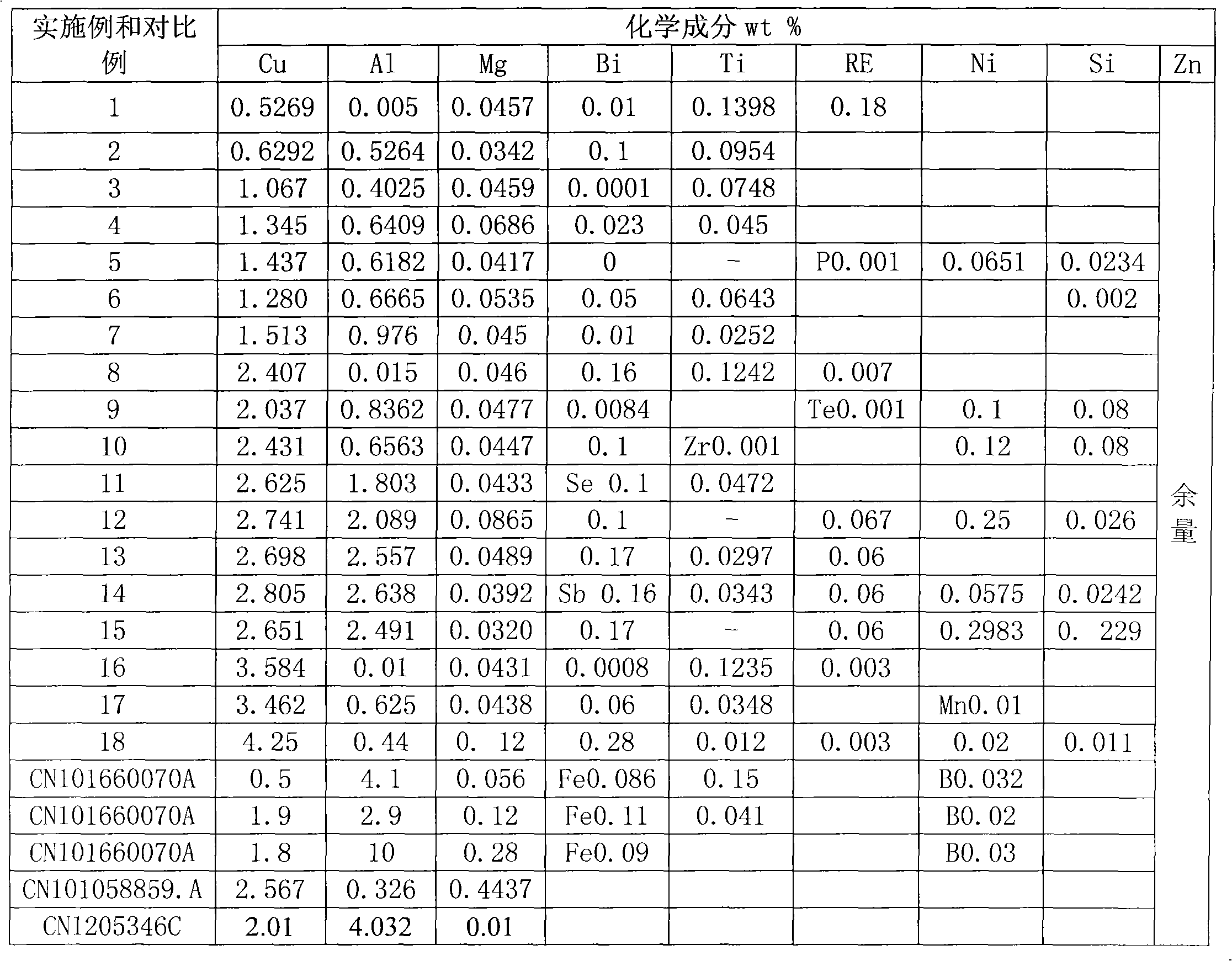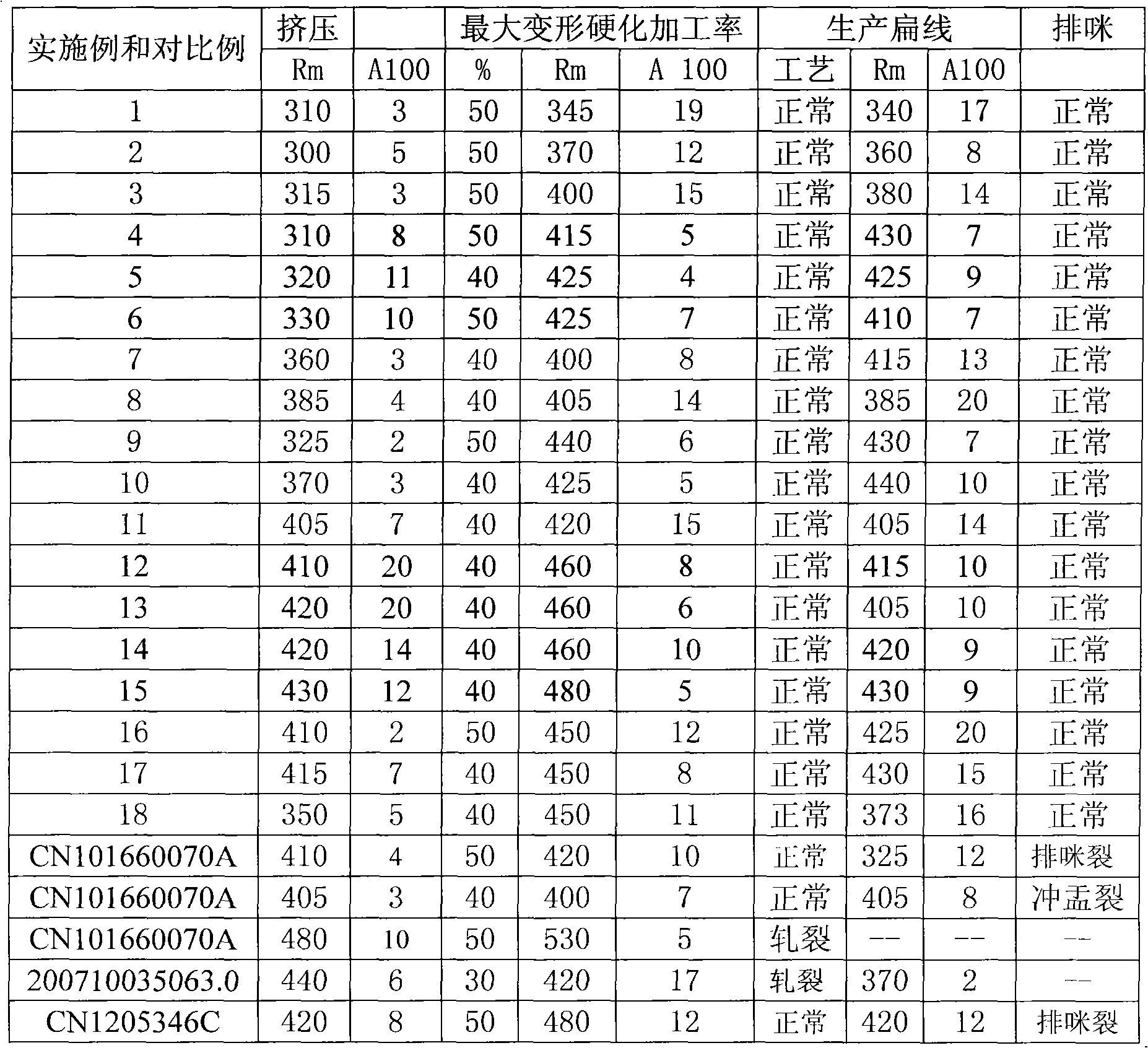Zinc alloy for zipper tooth belt and preparation method of zipper tooth belt
A technology of zipper teeth and zinc alloy, applied in application, clothing, sliding fastener components, etc., can solve the problems of small allowable pass processing rate, low pass processing rate, magnetic properties, etc., and achieve low intergranular corrosion sensitivity , good creep resistance, comprehensive performance improvement effect
- Summary
- Abstract
- Description
- Claims
- Application Information
AI Technical Summary
Problems solved by technology
Method used
Image
Examples
Embodiment 19
[0069] According to the design ratio, it is melted in an induction furnace with a melting temperature of 500-600°C and a refining temperature of 600-750°C. It is refined with a commercially available refining agent. After the refining is completed, a φ50 casting rod is continuously cast horizontally.
[0070] The chemical composition analysis results of the cast rod are as follows (% by weight): Cu 2.425 Al 2.072 Mg 0.100 Bi0.0001 Ni0.13%, Si 0.056%. The balance is Zn.
[0071] The cast rod is sawed and cut to the designed length, kept at 300°C for 2 hours, and then extruded into a billet of φ8.0. The extruded billet is stretched through multiple passes, stretched to a flattened round billet, and undergoes 2 times of annealing and rapid cooling in the middle. It is then flattened to a flat wire stock, with an annealing in between. The flat wire blank is rolled and drawn to make a flat wire with a specification of 0.9×3.95. The produced flat wire is discharged on the rice di...
Embodiment 20
[0081] According to the proportion of ingredients designed, it is smelted in an induction furnace at a melting temperature of 500-600°C and a refining temperature of 600-750°C, refined with nitrogen, and cast in an iron mold. The chemical composition analysis results are listed in Table 3:
[0082] Table 3 embodiment 20 chemical composition (weight %)
[0083]
Cu
Al
Mg
Bi
Ti
RE
Zn
Example 20
1.62
0.47
0.047
0.011
0.0329
0.012
margin
[0084] After the ingot is wagoned, it is kept at 300°C for 2 hours, and then extruded into a billet with a diameter of φ8.0, and the extrusion ratio is not greater than 100. After 2 times of annealing and rapid cooling in the middle. It is then flattened to a flat wire stock, with an annealing in between. The flat wire blank is rolled and drawn to make a flat wire with a specification of 0.9×3.95. The produced flat wire is discharged on the rice discharge ma...
Embodiment 21
[0088] Example 21, Big Ingot Extrusion Drawing Example
[0089] The ingredients are melted in an induction furnace at a melting temperature of 500-600°C and a refining temperature of 600-750°C, using a refining agent for refining, and semi-continuous casting of φ200 ingots after refining. The chemical composition analysis results are listed in Table 5:
[0090] Table 5 embodiment 21 chemical composition (weight %):
[0091]
Cu
Al
Mg
Ti
Ni
Si
Zn
Example 21
2.327
0.8326
0.0461
0.0651
0.0216
0.0124
margin
[0092] The ingot is sawed and cut to the designed length, and the round billet is extruded in a 2500-ton reverse extrusion machine, induction heating, extrusion temperature 360 ℃, multi-head extrusion, extrusion ratio not greater than 100. The extruded billet is stretched through multiple passes, annealed and rapidly cooled at least twice in the middle, and then flattened to a flat wire b...
PUM
| Property | Measurement | Unit |
|---|---|---|
| tensile strength | aaaaa | aaaaa |
Abstract
Description
Claims
Application Information
 Login to View More
Login to View More - R&D
- Intellectual Property
- Life Sciences
- Materials
- Tech Scout
- Unparalleled Data Quality
- Higher Quality Content
- 60% Fewer Hallucinations
Browse by: Latest US Patents, China's latest patents, Technical Efficacy Thesaurus, Application Domain, Technology Topic, Popular Technical Reports.
© 2025 PatSnap. All rights reserved.Legal|Privacy policy|Modern Slavery Act Transparency Statement|Sitemap|About US| Contact US: help@patsnap.com



